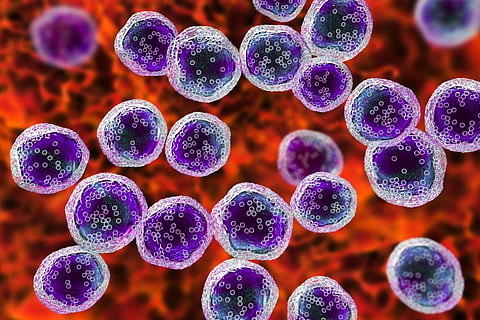FRIDAY, June 21, 2024 (HealthDay News) -- An experimental cancer treatment regimen is achieving full remissions in some patients with aggressive B-cell lymphoma, researchers report.
The five-drug combination does not include chemotherapy. Rather, it simultaneously zeroes in on several molecular pathways that diffuse large B-cell lymphoma (DLBCL) tumors rely on to survive. B-cell lymphoma is a cancer of cells in the body's immune system. DLBCL is the most common type of lymphoma.
This clinical trial, conducted by researchers from the National Institutes of Health, included 50 patients with DLBCL whose prognosis was grim. Their cancers had either returned after periods of remission or were no longer responding to treatment.
"Many of these patients who stopped responding to standard treatments would have otherwise died within a year, and now we have a good proportion who are still alive past two years, and some past four years," said study co-leader Dr. Christopher Melani, of the National Cancer Institute's (NCI) Center for Cancer Research.
The treatment combines five drugs — venetoclax, ibrutinib, prednisone, obinutuzumab and lenalidomide. Using the five initials, it's called ViPOR, for short.
The drugs were given simultaneously in two-week cycles, with a weeklong break between cycles.
Researchers said the regimen shrank tumors substantially in 26 of 48 (54%) patients evaluated, with 18 (38%) experiencing a complete response. In other words, their tumors disappeared.
At two years, 36% of all patients were alive and 34% were free of disease.
Researchers said the benefits were seen mainly in patients with two specific subtypes of cancer.
"DLBCL is one of the most genetically heterogenous forms of cancer, and as a result we don't have the ability to identify exactly which combination of drugs would be most effective for any given patient," Melani explained in an NCI news release.
But by combining five drugs, researchers say some combo -- two, three or more drugs -- is likely to prove especially effective against a particular patient's tumor.
In the phase 1b/2 trial, responses to six cycles of the ViPOR regimen varied by cancer subtype. Complete responses were concentrated in two subtypes. That included in 62% of people with non-GCB DLBCL, and 53% of those with a form of that's known as high-grade B-cell lymphoma double-hit.
At two years, participants with those two cancers had higher rates of overall survival and survival without tumor progression than other participants. Researchers said those cancers depend on the survival mechanisms that ViPOR targets.
ViPOR also helped 30% of patients whose lymphomas had not responded to or had returned after CAR T-cell therapy achieve lasting remissions. CAR T-cell therapy enlists a patient's own T-cells to help the immune system destroy cancer. It is the current standard of care for people whose DLBCL has returned.
Compared to standard treatments, side effects from the five-drug regimen were described as mild to moderate. Researchers said additional drugs could potentially be added to the regimen.
They are studying ViPOR in people with other lymphomas that have resisted treatment and are developing a larger phase 2 study to confirm their findings.
Further research is needed to develop therapies for GCB DLBCL subtypes that were less responsive to ViPOR.
The findings were published June 20 in the New England Journal of Medicine.
More information
UC Davis Health has more about precision medicine.
SOURCE: National Cancer Institute, news release, June 19, 2024


